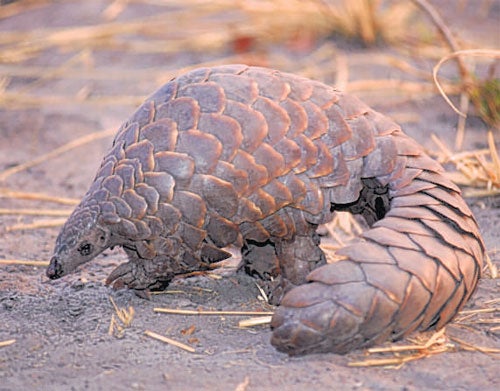Where the weird things are: Meet the pangolin, the mammal that thinks it's a reptile

Your support helps us to tell the story
From reproductive rights to climate change to Big Tech, The Independent is on the ground when the story is developing. Whether it's investigating the financials of Elon Musk's pro-Trump PAC or producing our latest documentary, 'The A Word', which shines a light on the American women fighting for reproductive rights, we know how important it is to parse out the facts from the messaging.
At such a critical moment in US history, we need reporters on the ground. Your donation allows us to keep sending journalists to speak to both sides of the story.
The Independent is trusted by Americans across the entire political spectrum. And unlike many other quality news outlets, we choose not to lock Americans out of our reporting and analysis with paywalls. We believe quality journalism should be available to everyone, paid for by those who can afford it.
Your support makes all the difference.A 15kg walking artichoke? A metre-long ant-eating pine cone? Even though the pangolin is fairly widespread in savannah woodland right across sub-Saharan Africa, it's hard to describe in animal terms. For a start, this bizarre mammal is the only warm-blooded creature on the planet that is completely covered in scales.
Odd, then, but clever with it. When threatened, a pangolin curls up into an armoured ball. Investigate, and the tail scythes back and forth, its blade-like scales slicing into careless paws or fingers. Persist, and a pungent, skunk-style dowsing from its anal glands helps get the point across.
Uncurled, a pangolin looks more reptile than mammal; crocodilian tail at one end; pointy, toothless head and 50cm tongue at the other. It walks on hind legs, front claws held up out of harm's way and tail extended as a counter-balance.
Pangolins are sometimes known as "scaly anteaters" – those impressive claws are for excavating anthills – but anteaters (New World) and pangolins (Old World) are unrelated. Their similarity comes down to evolution having separately equipped each with similar gear for an ant-based lifestyle.
The ground pangolin is one of eight species worldwide. All have been ascribed mystical properties by traditional societies – and unfortunately this has been their undoing: pangolin scales are highly prized in the Far East as traditional medicine and poaching is rampant.
So, how to see one? To spot a pangolin you'd need to be out at night – or down a hole by day. These shy loners emerge after dark to sniff out ants and termites. If you see more than one, it'll be a youngster hitching a ride on its mother's tail.
The good news is that you could stumble across a pangolin in suitable habitat almost anywhere, from the acacia scrub of South Africa's Kruger Park to the ebony groves of Zambia's Luangwa Valley. The bad news is that you probably won't. Their elusiveness is legendary; even bush-hardened game rangers go years without clapping eyes on one. My closest encounter was a pangolin-esque discarded car tyre (I could swear it twitched).
Until recently, my best advice would have been to hang around anthills, ignore the statistics, and hope. However, a new project at Mundulea Reserve in Namibia, where pangolins are being monitored, has raised the odds.
Expert Africa (020-8232 9777; expertafrica.com) offers a 17-day "Rhino Self-Drive" trip to Namibia that visits Mundulea in search of pangolins, plus other exclusive destinations for cheetahs, desert rhinos and a host of other Namibian wildlife. £4,570 per person, including international flights.
Mike Unwin is the author of '100 Bizarre Animals', published by Bradt Travel Guides ( bradt-travelguides.com), £16.99
Join our commenting forum
Join thought-provoking conversations, follow other Independent readers and see their replies
Comments